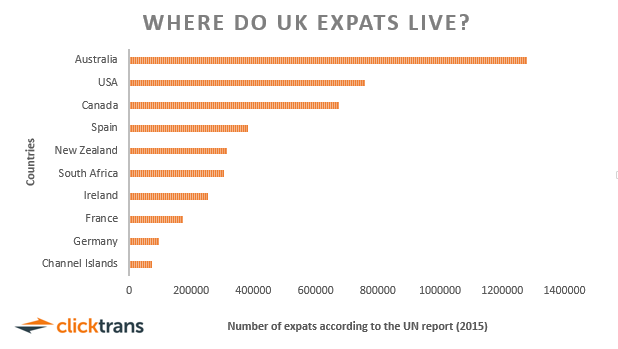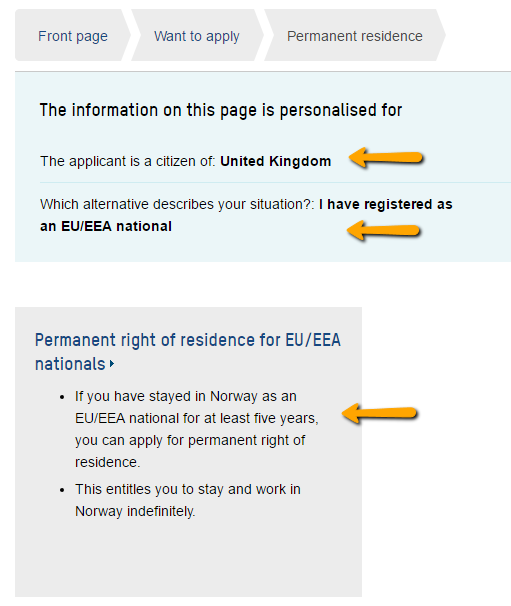Moving out of the UK. What should I know?
Moving to a foreign country is difficult. There is no doubt about that. Either you make this decision alone or with your partner or family, there still will be a lot to take care of before you actually make this move. Though, you can definitely turn it into an exciting and memorable experience (the latter is guaranteed actually, you need to work on the first one, though!). Norway, Spain, Greece? Where would you like to live?
As with every life-changing event, if you can have an influence on how it unfolds – embrace it! Preparation is the key 🙂 Especially in post-Brexit times, when many people feel misinformed and lost in the news coming from different sources.
So, we really want it to go off without a hitch! In this article, you will find hints and tips on:
- Moving out of the UK
- Post-Brexit highlights
- Where do Brits move to?
- What to do before I move out?
- What documents should I take with me?
- How do I feel at home in the new country?
- How do I make myself eligible to work in the destination country (EU)?
- Do I need to apply for residency?
- How do I rent a flat in my new home country?
- Removal – how do I organise it?
Post-Brexit highlights
Want to travel within the EU?
Are you still wondering if anything has changed for you after the referendum travel-wise?
You can travel freely within the EU using a UK passport.
Are there any visa requirements to enter other EU countries?
No, there aren’t. You don’t need a visa to enter another EU country.
Will my Europian Health Insurance Card work in EU member countries?
Yes, you can access healthcare services, as long as you possess EHIC card.
Want to live abroad?
As a British citizen, am I eligible to work in another EU country?
Yes, you are EU citizen. You can work and live in EU member country.
Am i entitled to medical care in another EU country?
Yes, you can receive healthcare in another EU country.
source: www.gov.uk (last update: 19.01.2017)
Where do UK citizens move to?
I am sure that some countries crossed your mind immediately. Let’s look at the UN Population Division report on International migration flows (2015) below.
Apparently, Britons have not been particularly interested in moving to other European countries. Among the top five countries, we move into, the only European country is Spain, with its 4th place. Other popular destination countries within the EU are: Ireland, France and Germany.
Undeniable winners are Australia and the US! In 2015 in Australia there have already been 1277474 expats. Look at the chart to find out where British expats live.

International migration flows to and from selected countries: The 2015 revision (UN, 2015)
You can access raw data here if you’d like to know more.
“Before I move out ” checklist
- Plan your budget – will you still be employed in the UK and work from abroad? Will you look for a job when you settle in a new home or have you already made some job arrangements? These situations are very different and each needs to be considered carefully. Try to list your future expenses (let’s say expenses of the first month of living abroad), list sources of your income, calculate how exchange rate, inflation, possible additional costs of medical care, plane tickets will affect it. Make sure expenses do not exceed your income 🙂
- Taxes – research the taxation policy in your new home country and check which taxes will apply to you in the new country and in the UK. If you are employed in the UK and live abroad, check with your HR specialist, as to where you need to pay your taxes. You can ask for meeting with a tax consultant, some can organise them.
- Healthcare – NHS is a residence-based medical care system, so when you move out abroad you will not be registered in NHS anymore. Make sure you register in your home country local healthcare system. Until it’s done take out your health insurance
- Notify relevant authorities in the UK – remember to tell your GP, that you are moving permanently or temporarily. Your GP will be able to advise you whether you are entitled to healthcare paid for by the UK. Notify the following authorities as well: Social Security Office, HM Revenue & Customs, Department of Work & Pensions. You will not only be able to get some formalities sorted, but you will get all the necessary information as well.
I will elaborate on some of the above later in the article.
What documents should I take with me?
Depending on your life and work situation and your destination country you may need these documents to make some arrangement e.g. rent a flat, create a bank account, register in the local medical care system.
- ID card / Passport
- Birth certificate
- Job certification documents
- Skills certificates
- Security clearance/good conduct certificate
Remember to research your new home country policy and bring required documents!

Make your new country a home country
The acculturation process is known to be a struggle, once not approached in a proper way. Acculturation is basically, what you are going through when you land in a completely new place, you are not familiar with the culture, which is a huge part of human’s identity. You feel like a stranger.
Further, in the article, I talk to Megan from www.meganstarr.com travel blog – American expat who lived in Norway. So what’s her experience in living outside her home country? I asked about practical and emotional aspects of this transition as well.
Culture seems to be a very general concept. Not easy to grasp. So let’s make it less abstract. Culture is food you ate every day, hours of your meals. The way you small-talked to the lady in the post office. The way you interact with people at work. What type of behaviours you find appropriate. Style of architecture that is pleasant to your eye and familiar.
So, all these things you experienced until now, may change once you settle in a new home country.
There are some tips that can help you get the sense of familiarity in your new home country and battle homesickness:
- Before travelling there, try to research the city you will live in, check expats forums, local laws, customs and food. You may go to CouchSurfing meetings if you want to find an international group of people in the similar situation to yours
- If you can try visiting the place before you move there permanently. You can go there for a week long holidays just to get a glimpse of how it’s like to live there.
- Considering buying a flat? Try renting first. The fewer obligations the better, especially if you are not yet familiar with the local law and do not have many people to turn to in case there are any problems.
- Be a citizen, not a stranger. To feel comfortable in your new home city, try to learn the local language. Even the basics will help to connect to the local people. The sense of acceptance you get from other citizens is the first step to feeling like you are not a stranger anymore 🙂
So what was the most challenging for Megan when she came over to Norway and decided to stay…for 4 years!
I asked Laura Burgess from http://www.laurahamburgers.com/ about her experience. She’s an American expat and has been living in Greece since August 2015. Laura shared with me things she likes the most about Santorini where she lives now, what challenges she experienced when she first came to Greece and how is it to be there now.
Any particular obstacles you experienced in your first year of living there?
So, how would you summarise the situation on the job market now?
Registration of residence
Depending on the country you choose, there might be different rules when it comes to registering residence. Some countries do not require registration and some do. Let’s take a closer look at Spain first, as it is the most popular destination for British expats among other European countries.
Spain
Do I need to apply for residency in Spain?
Yes, if you plan to reside for more than 3 months or live there permanently.
What should I do first?
As stated in the guideline on gov.uk you “should register in person at the Oficina de Extranjeros in their province of residence or at designated Police stations. You will be issued a credit card size Residence Certificate stating your name, address, nationality, NIE number (Número de Identificación Extranjero) and date of registration. “According to the new requirement announced by the Spanish government in 2010, you also may need to prove you are able to support yourself financially. You may be asked for proof of private or public healthcare insurance as well.
Germany
Do I need to apply for residency in Germany?
Yes, if you plan to reside for more than 3 months or live there permanently.
Registration of residency is mandatory in Germany. You should show up at the local registration office (Einwohnermeldeamt, in some places known as Kreisverwaltungsreferat (KVR) or Bürgerbüro) within 14 days of your arrival. You will need your British Passport, proof of your address (leasing contract etc) and possibly marriage/divorce certificates.
Norway
Do I need to apply for residency in Norway?
British citizens need not apply for a residence permit, but for stays of longer than 3 months, contact the Norwegian Embassy for further information about entry requirements.
As Megan suggested, we visited www.udi.no to find further information about the process of aquiring permanent residency permit:

source: www.udi.no
If you already got the job offer or you aspire to set up a business in Norway, you are free to enter for up to 6 months. You should go to the nearest local police station(or centre for foreign workers) and apply for your personal number.
Living abroad can be exciting and challenging at the same time https://t.co/9HwtMpOlJb Thank you for your tips @MeganCStarr ! pic.twitter.com/ZAVmURtQcn
— Clicktrans (@Clicktrans_com) March 6, 2017
France
Do I need to apply for residency in France?
NO. Although, if you plan to reside for more than 90 days it’s advised to register in the local prefecture.
Belgium
Do I need to register in Belgium?
Yes. Otherwise, you may experience some difficulties, when setting up a bank account or enrolling your kids in school. Register in the local city authorities.Greece
Do I need to register in Greece?
As XpatAthens.com told me: ” It depends on how long a person stays. Usually, if it’s longer than 90 days, the person will need to apply for residency. A person can apply at the Greek Police Aliens Bureau (police station). The British Embassy in Athens will have more detailed information about the procedure, documents needed, etc.”What about permanent residency permit for a non-EU citizens?
Getting Greek residency is NOT easy. To get it (without getting married), one must have sufficient funds (over 2,000/euros a month) and even so, that may not be enough. The easiest way to get residency is to get married.
Laura & @XpatAthens Big thank you for sharing with us interesting info on expats' life in Greece 🙂 https://t.co/9HwtMpOlJb #expat #greece pic.twitter.com/CMY4ZKObjD
— Clicktrans (@Clicktrans_com) March 13, 2017
Ireland
Do I need to register in Ireland?
NO. Although, to some authorities may ask you for address confirmation. Your rent agreement will suffice.To access health care services, get a permanent contract or pay your taxes you will need PPS number. Go to the local Social Welfare office, you can access the full list of offices by county here.
How do I rent a flat in my new home country?
The intricacies and formalities of renting a flat vary across countries, counties even towns! Although, there are some universal truths to remember and tips to follow:
- Landlords often ask tenants for a proof of employment and letter that states their annual/monthly income. It’s necessary, simply to prove you earn enough to support yourself and pay the rent. Daniel who lived in France told us: ” My friend who lived in Annecy, was declined tenancy by the owners who were concerned about his employment status”. These situations happen rarely, though if France is among the countries you’d like to move into, you should remember to provide documents mentioned above!
- You will need a bank account to rent a flat
- In some countries, where residence registration is not obligatory, you can treat your tenancy contract as the proof of address
- Before signing any documents, read them thoroughly.
- Be careful with estate agencies, especially if the advertisements you found on the Internet do not contain company details. Do not pay, until you are sure the company really exists.
Moving home – how do I make it easy?
We already wrote about home removals here:
https://clicktrans.com/blog/moving-home-how-much-does-it-cost/
If you need further advice on moving furniture, go here:
https://clicktrans.com/blog/how-to-move-furniture/
Are you already living in one of those countries? Tell us your story in the comments section or share it on Twitter!
Would you like to live in one of those countries? Click on the link below to get quotes for your removal>>











